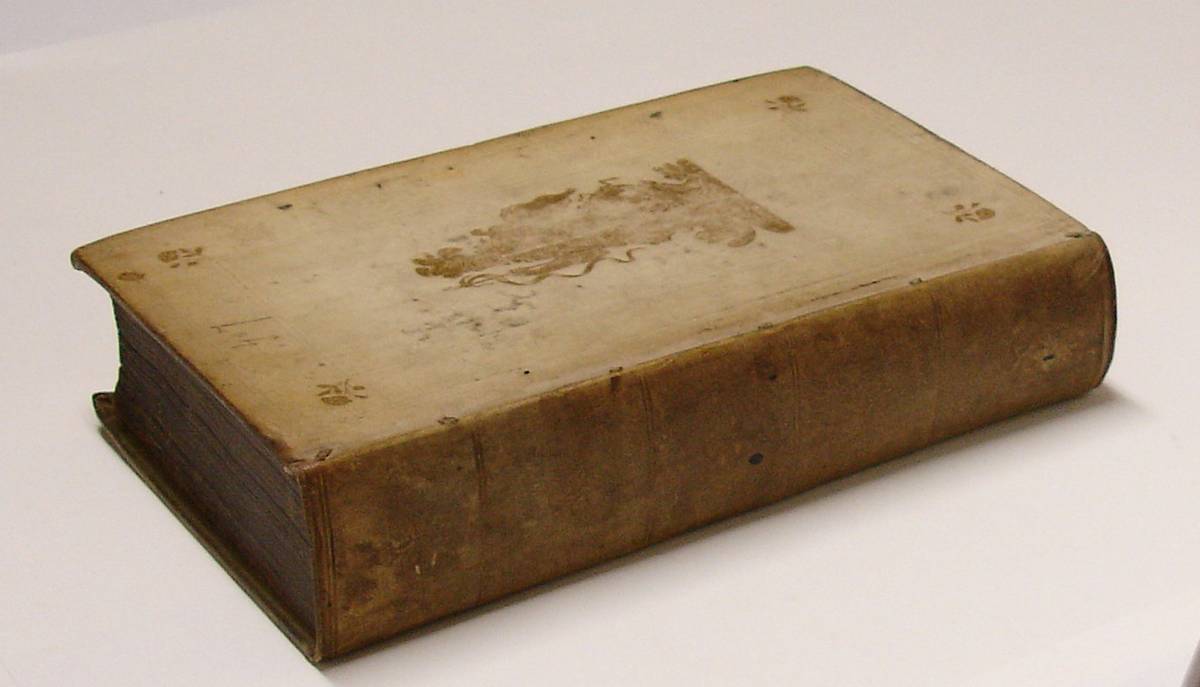FRONTINUS.
S. Julii Frontini libri quatuor Strategematicon, cum notis integris Francisci Modii, Godescalci Stewechii, Petri Scriverii, & Samuelis Tennulii. His accedunt, cum P. Scriverii, tum aliorum doctorum ineditae observationes, curante Francisco Oudendorpio, qui & suas adnotationes, variasque MStorum lectiones adjecit. Editio altera multo auctior & emendatior.
Leiden (Lugduni Batavorum), Apud Sam. et Joann. Luchtmans, 1779.
8vo. (LXXVIII),570,(132),(2 blank) p., frontispiece. Vellum. 22 cm (
Ref: STCN ppn 189887621; Schweiger 2,369: 'Mit Bereicherungen in den Noten'; Brunet 2,1409; Graesse 2,639; Ebert 7963; Spoelder p. 628, Leiden 5) (
Details: Prize copy, but without the prize. Boards with the gilt coat of arms of the city of Leyden. Frontispiece depicting both sides of a coin from the time of Domitianus (81-96 AD), showing a portrait of a bearded man with the name of proconsul Frontinus in Greek; on the tail-side a river goddess holding a reed; below her a text in Greek, revealing the names of the issuing magistrates Reginus and Myrton and the place of issue Smyrna. In his 'Ad Lectorem' Van Oudendorp convincingly proves that the portrayed figure on the coin is not Frontinus, but Hercules, an assumption that is accepted by later numismatics.
§ The upper quarter of the pages contains the Latin text, underneath that the commentary) (
Condition: Without the prize. All four decorative fastening ribbons gone. Vellum soiled, back browned. Gilt on the boards a bit worn away. Small bookplate on the verso of the flyleaf, small withdrawal stamp on the verso of the title leaf) (
Note: Now that the intensive study of the ancient languages and cultures is in decline, it seems hard to imagine that the ancient models once exerted a profound influence on every domain of post-classical life and thought in Europe. One such domain was the art of warfare. Between the end of the 15th and the middle of the 17th century, a period in which numerous wars were fought, the ancient works on Roman and Greek strategies and tactics were eagerly studied by humanist scholars and the military elite. One such surviving work was written by the Roman civil servant and politician Sextus Julius Frontinus, 30-104 A.D. His works 'are essentially practical, dealing with professional subjects in a straightforward style admirably suited to his purpose'. During the reign of the emperor Domitian he produced his 'Strategemata', a general manual of 'historical examples illustrating Greek and Roman strategy for the use of officers', which survives in four books (OCD 2nd ed. p. 448). In the year 86 Frontinus was created Proconsul of the province Asia (Minor). Under Nerva (97 A.D.) he was appointed 'curator aquarum', and wrote 'De aquaductu Urbis Romae', an account of the water-supply of Rome. Many inscriptions bear witness of his activities.
§ The Eighty Years' War or the Dutch War of Independence, which lasted from 1568 till 1648, was a revolt of the Provinces of the Netherlands against the political and religious hegemony of Philip II of Spain. In its struggle for political, religious and economic freedom the young Dutch republic was confronted with a Spanish imperial army of enormous size. 'Dutch Humanism of the period and its study of classical philology aided the technical and tactical evolution of the Dutch army'. (The Classical Tradition, Cambr. Mass. 2010, p. 978) Works of the Flemish classicist Justus Lipsius, 1547-1606, his 'De militia Romana' and 'Poliorcetica' 'inspired and guided Dutch military reform and organization after the pattern of the ancients and on the principles of Roman stoicism, the ancient philosophy of discipline and self-control (...)'. (Idem, ibidem) The great general Prince Maurice of Nassau was in fact a student of Lipsius in Leiden. He understood that whoever knew how to rule the troops with the help of the Roman art of war, would be able to dominate the battlefield. 'The princes of Orange studied everything available concerning the military skills practiced by the ancient Greeks and Romans, and they spared no trouble, work, or expense in transferring the tennets found there into practice. They commissioned learned philologists to carry out projects of military science'. (Idem p. 979)
§ Frans van Oudendorp, 1696-1761, was the last great Dutch latinist of the 18th century. He was professor of History and Eloquence at the University of Leiden. He produced a valuable and still useful edition of Lucanus (1728) and edited Caesar and Suetonius. His first edition of Frontinus was published in 1731. His son Cornelis published in 1779 at the request of the firm of Luchtmans this second revised and augmented edition) (
Provenance: Bookplate of A. Pitlo, showing a radiant sun, with the motto 'Plus est en vous'. Designed by Pam Georg Rueter, signed with the letter 'R' in the left corner. The Dutch jurist Adriaan Pitlo, 1901-1987, was for 30 years professor of private and notarial law. The 'Festschrift' that was made in 1970 on the occasion of the 25th anniversary of his professorate also bears the title 'Plus est en vous') (
Collation: +6 (minus leaf +6), *-4*8, 5*2; A-2X8 (leaf 2X8 blank)) (Photographs on request)
Book number: 130064 Euro 280.00
Keywords: (Oude Druk), (Rare Books), Dutch imprints, Frontinus, Kriegskunst, Latin literature, Prize copy, Prize copy Leiden, Roman history, antike altertum antiquity, römische Geschichte, römische Literatur, warfare
 FRONTINUS.
FRONTINUS.

